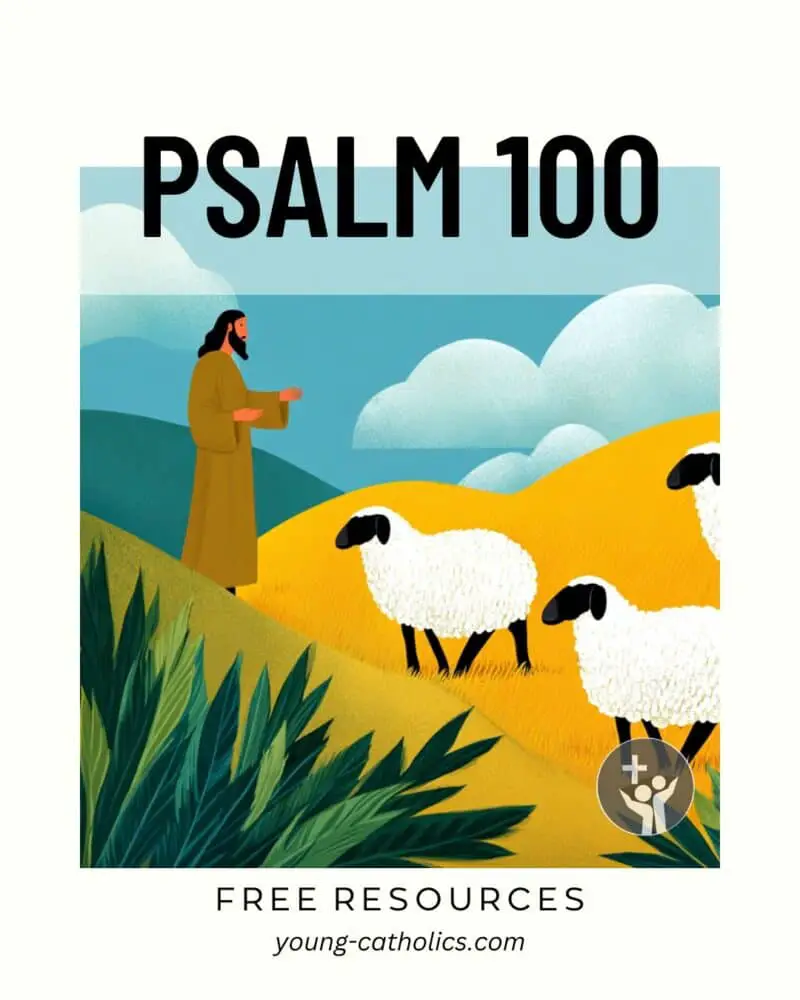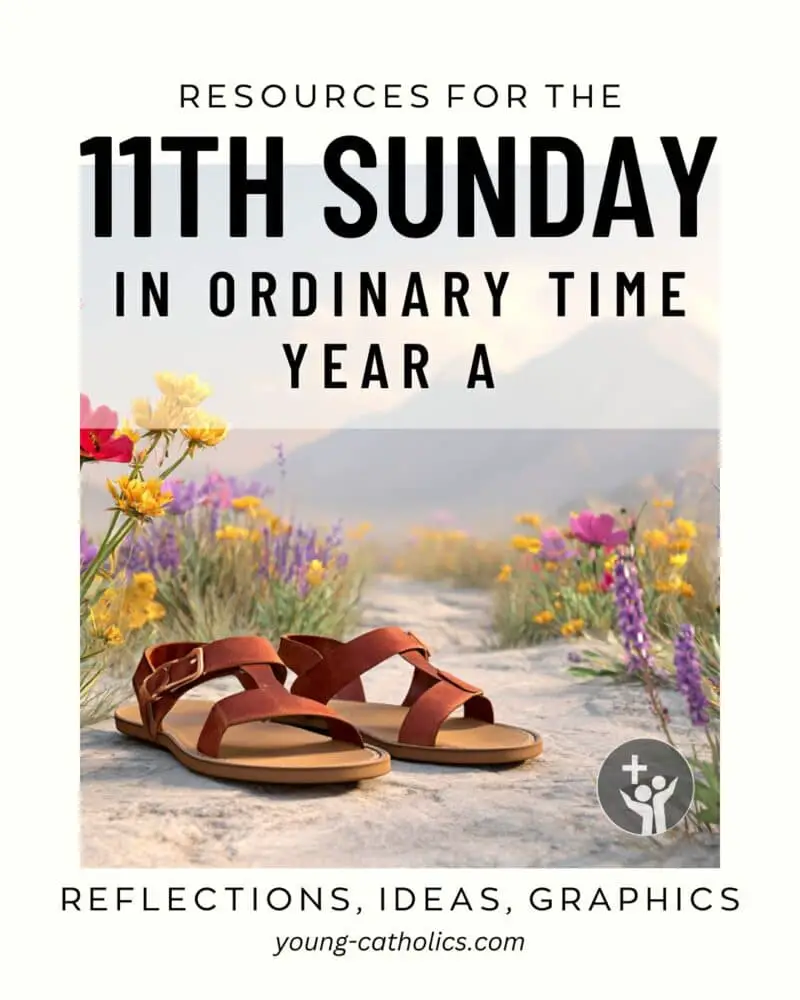Psalm 100

Psalm 100 is a psalm of praise and thanksgiving. It invites us to give thanks to God and serve Him with joy. This psalm calls us to recognize God as our Creator and to rejoice in His goodness. It is a simple and joyful prayer that lifts our minds to God.
This psalm begins with a call to worship. It asks everyone to make a joyful noise to the Lord and to approach Him with gladness. The psalm reminds us that God made us and that we belong to Him. It emphasizes our role as His people and the sheep of His pasture.
The psalm also highlights God’s love and faithfulness. It reminds us that His goodness lasts forever. His faithfulness continues through all generations. These truths give us confidence and hope as we live our lives.
Psalm 100 is a beautiful way to express our gratitude to God. It helps us focus on His kindness and care. When we pray this psalm, we join in praising God with joy and trust. It reminds us to thank Him for His blessings and to worship Him with a joyful heart.
Joyful Praise and Gratitude to God
This psalm has three main themes: joy, thanksgiving, and trust in God. It shows us how to praise God with joy. The psalm says, “Serve the Lord with gladness; come before Him with joyful song.” It reminds us that worship should be filled with happiness because we are honoring our Creator.
Thanksgiving is also a key theme. The psalm says, “Enter His gates with thanksgiving, His courts with praise.” It teaches us to thank God for His blessings. Gratitude helps us recognize how much He has done for us. The Church often uses this psalm in prayers and liturgies, especially to give thanks during Mass.
The third theme is trust. The psalm says, “Know that the Lord is God; He made us, we belong to Him.” This reminds us that God created us, and we are His people. As Catholics, we trust in God’s care and love for us, just as a shepherd cares for his sheep.
These themes help us see the psalm as a guide for our prayer. It shows us how to approach God with joy, give Him thanks, and trust in His care. It is a call to live each day with gratitude and love for God.
A Call to Joy and Gratitude in Our Lives
Psalm 100 is still important for us today. It reminds us to praise God with joy, even when life is hard. The psalm encourages us to focus on God’s goodness and love. This helps us to trust Him and stay hopeful.
In a busy world, it is easy to forget to thank God. Psalm 100 teaches us to pause and show gratitude for His blessings. Whether it is our family, health, or daily needs, everything we have comes from Him. Thanking God helps us see His care in our lives.
The psalm also reminds us that we belong to God. In a world where people can feel lost or unsure, this is comforting. We are God’s people, and He loves us deeply. Remembering this can help us find peace and purpose.
Praying Psalm 100 can help us grow closer to God. It is a simple way to worship Him with joy and thanksgiving. It reminds us to trust Him and live each day with gratitude and hope.
A Prayer Based on Psalm 100
A Prayer of Joy and Gratitude
Lord, thank You for all the good things in my life.
Help me to see Your blessings each day.
I want to serve You with a happy heart.
Teach me to worship You with joy.
You made me, and I belong to You.
You know my struggles and my dreams.
Help me trust You when life is hard.
Guide me like a shepherd guides his sheep.
Your love lasts forever, and it never changes.
Even when I feel alone, You are there.
Remind me of Your care when I feel lost.
Give me the strength to follow You.
Thank You for my family, my friends, and my gifts.
Help me to use them to make the world better.
Show me how to live with kindness and love.
Teach me to share Your goodness with others.
Lord, I come to You with a thankful heart.
I praise You for all You have done for me.
Help me live each day with joy and hope.
I trust in Your love forever. Amen.
A Joyful Call to Worship
Psalm 100 is a short song of praise that invites all people to come before the Lord with joy. It reminds us that God made us and we belong to him. We are his people, cared for like sheep by a loving shepherd.
The psalm encourages us to serve the Lord with gladness. It calls us to sing and to enter his gates with thanksgiving. Worship is not meant to be gloomy. It is a celebration of God’s goodness and faithfulness. His love lasts forever, and his truth remains through every generation.

4th Sunday of Easter Year C (Good Shepherd Sunday)
The Lord is Our Shepherd
Psalm 100:1-2, 3, 5 is a song of joy and trust. It calls all people to come before the Lord with gladness and to serve him with a joyful heart. It reminds us that we belong to him because he made us. Like a shepherd cares for his sheep, the Lord watches over us and provides for our needs.
It also tells us that God is always good. His love never ends, and his care is for every generation. This is a reason to give thanks and to praise him each day. The psalm invites us to live with gratitude, knowing that we are safe in his care.

11th Sunday in Ordinary Time Year A
Joyful Praise to Our Shepherd
Psalm 100: 1-2. 3. 5 invites all people to come before the Lord with joy. It calls us to serve him with gladness and to sing in his presence. We are reminded that he is our Creator, and we belong to him. Like a shepherd cares for his sheep, he guides and protects us each day.
The psalm also celebrates God’s goodness. His love never ends, and his faithfulness reaches to every generation. Knowing this, we can trust him completely. This is a song of gratitude, urging us to praise the Lord for who he is and for the care he shows to his people.
At Weekday Masses
- Christmas Weekday on January 5 – Psalm 100:1b-2, 3, 4, 5: Joyful Worship of the Lord
- Friday of the 22nd Week in Ordinary Time I – Psalm 100:1b-2, 3, 4, 5: Joyful Worship
- Tuesday of the 24th Week in Ordinary Time II – Psalm 100:1b-2, 3, 4, 5: We Are His People
- Saturday of the 24th Week in Ordinary Time I – Psalm 100:1b-2, 3, 4, 5: Enter the Lord’s Presence with Joy
- Thursday of the 34th Week in Ordinary Time II – Psalm 100:1B-2, 3, 4, 5: Called to the Feast of the Lamb
- Monday of the 29th Week in Ordinary Time II – Psalm 100:1b-2, 3, 4ab, 4c-5: We Belong to the Lord
- Saturday of the 5th Week of Easter – Psalm 100:1b-2, 3, 5: Joyful Praise to God
- Thursday of the 8th Week in Ordinary Time II – Psalm 100:2, 3, 4, 5: Eternal Joy in the Lord
Resources
Social Media Graphics and Bulletin Artwork
The Shepherd and His Flock

Enhance your bulletin or newsletter with this beautiful image for Psalm 100. It reflects the joy of belonging to the Lord, who cares for us like a shepherd for his sheep.
This artwork is ideal for encouraging worship, gratitude, and trust in God’s guidance within your faith community. Perfect for parish use or other ministry settings.
Paid subscribers may download a large copy this digital artwork without watermarks, suitable for use in bulletins, social media, newsletters, etc., free of charge by clicking here. You must be logged in as a paid subscriber to access the file.
Only current paid subscribers have the rights to use the artwork.
Questions and Answers
What is Psalm 100 about?
Psalm 100 is a psalm of praise and thanksgiving. It tells us to worship God with joy, thank Him for His blessings, and trust in His care. It reminds us that God made us and that we belong to Him.
Why is Psalm 100 important to Catholics?
Catholics use Psalm 100 to praise God and give thanks for His goodness. It is part of the prayers and worship in the Church. It helps us focus on God’s love and care for us.
How is Psalm 100 used in the Church?
Psalm 100 is often prayed or sung during Mass, especially in times of thanksgiving. It is also included in the Liturgy of the Hours, where it is used to praise God in daily prayer.
What does Psalm 100 teach us about God?
The psalm teaches that God is our Creator and Shepherd. He loves us, cares for us, and is always faithful. It also shows us that God’s goodness lasts forever.
How can I apply Psalm 100 in my life?
You can pray Psalm 100 to thank God for His blessings. It can help you worship Him with joy and gratitude. It is also a reminder to trust in His love and care every day.
What are the main themes of Psalm 100?
The main themes are joy, thanksgiving, and trust. The psalm calls us to worship God with gladness, thank Him for His blessings, and trust in His care as His people.
Who wrote Psalm 100?
The author of Psalm 100 is not named. Some psalms were written by King David, but the writer of this psalm is unknown.
Why does Psalm 100 call us the sheep of His pasture?
This image shows that God is our Shepherd, and we are His people. It reminds us that He cares for us and protects us, just like a shepherd cares for his sheep.
A Song of Joy and Gratitude
Psalm 100 is a joyful call to praise God. It reminds us to worship Him with gladness and thank Him for His blessings. The psalm opens with an invitation for all people to make a joyful noise to the Lord. It encourages us to serve Him with gladness and come before Him with joyful songs.
This psalm teaches us that God is our Creator. He made us, and we belong to Him. We are His people, like sheep cared for by a shepherd. This image reminds us of God’s love and care. It gives us confidence that we are never alone.
Psalm 100 also speaks of God’s goodness and faithfulness. His love lasts forever, and His care never ends. This is a source of hope for all generations. By praying this psalm, we are reminded to trust God and thank Him for His constant love.
This psalm is as meaningful today as it was for the people of Israel. It invites us to reflect on God’s blessings and express our gratitude. It is a prayer filled with joy and trust in the Lord.
Your Turn
Take a moment today to read Psalm 100. Reflect on its message of joy and gratitude. Think about how it applies to your life. How can you thank God for His blessings and trust in His care?
After reading the psalm, share your thoughts in the comments. What stood out to you? How does this psalm inspire you to praise God? Your insights could encourage others to reflect and grow. Let’s join together in praising God with joy and thanksgiving!




Leave a Reply